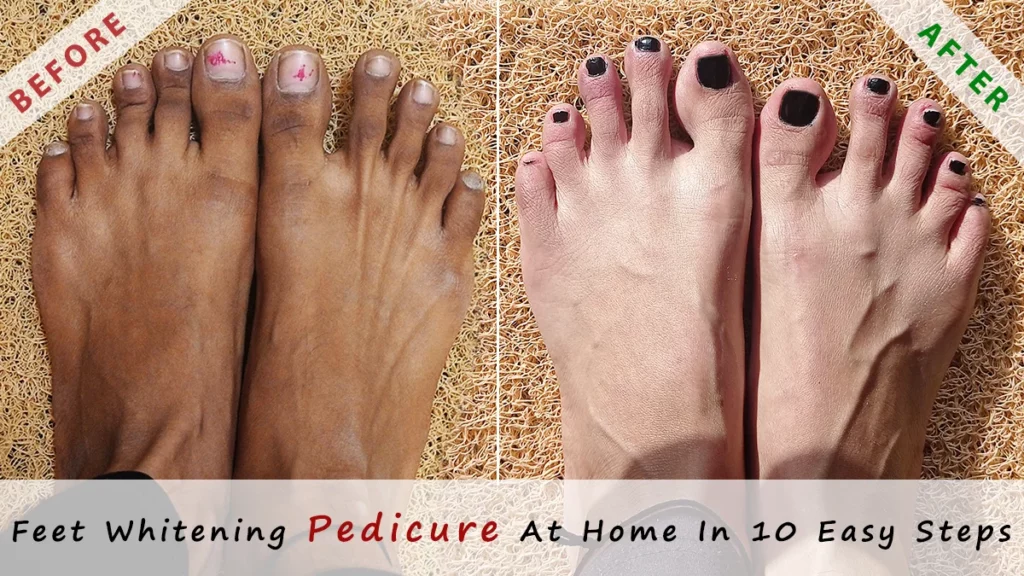During the monsoon season, there is a 30% increase in hair fall in almost 90% of people. Usually, shedding 50-60 hairs per day is normal, but the number can go up to 250 or more during the monsoon season. Interestingly, hair grows faster in summer.
Simple ways to prevent hair fall in monsoon
Understanding the Causes of Hair Fall

The Science Behind Monsoon Hair Woes
During the monsoon season, your hair can be negatively affected by factors such as acid rain, high humidity levels, and increased risk of infections.
Impact of Humidity
High humidity makes hair swell, which can lead to tangling and breakage. And don’t forget the fungal infections like dandruff, which thrive in humid conditions.
Effects of Rainwater
Rainwater may seem harmless, but it contains pollutants and impurities that can weaken your hair strands. The acidic rainwater can damage hair cuticles, leading to frizzy and brittle hair.
Preventive Measures

Cover up your hairs
Carry an umbrella or a raincoat if you have to step out in the rain. Always keep your hair covered with a cap or scarf, whether it is no rain outside. You can also carry a small microfiber towel in your bag to dry your hair if you get drenched in the rain.
Wash away the rainwater
Experts state that rainwater contains pollutants and chemicals from the air that can clog hair follicles, resulting in dull, itchy, and brittle hair. So whenever you get drenched in the rain, wash your hair immediately after you reach home.
Don’t comb & tie wet hair
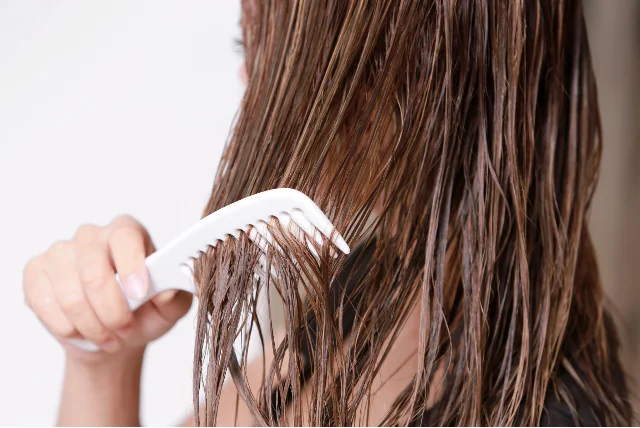
Often, we brush & tie our wet hair in a hurry to go out. Keep in mind that your hair is very fragile and breaks when it is wet. Instead of a hairdryer, use a soft microfiber towel that dries out your hair rapidly and reduces friction between the hair.
Also, avoid combing hair in wet conditions, leading to shedding more hair. And, make sure when running the comb through your hair that you’re combing slowly.
Hair Care Routine
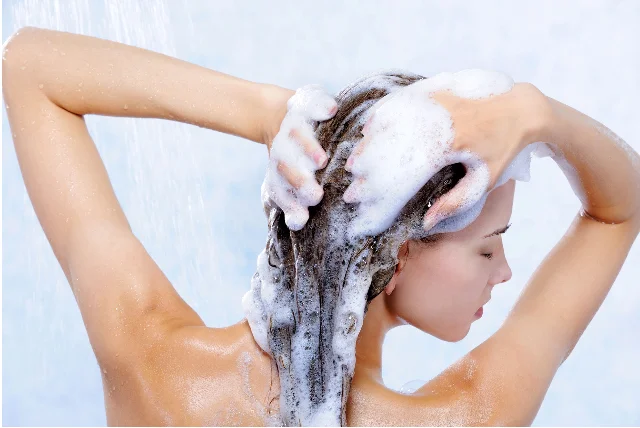
Regular hair wash
During monsoons, the excessive humidity in the weather leads to an oily scalp that attracts dirt, making your hair weak, dry, rough, and brittle, eventually leading to falling.
It is essential to wash your hair regularly to avoid it. Use mild antibacterial shampoo as it helps fight fungal infections during rainy weather. Focus more on cleaning the scalp rather than the length of your hair.
Never skip conditioner
A rich conditioner smooths the cuticle, giving you soft hair that looks healthy and manageable. Apply the conditioner with a wide-tooth comb to spread it well.
Never apply conditioner on your scalp, as it will make the roots oilier than they naturally are. Rinse your hair with cold water for extra shine.
Avoid using styling tools on your hair
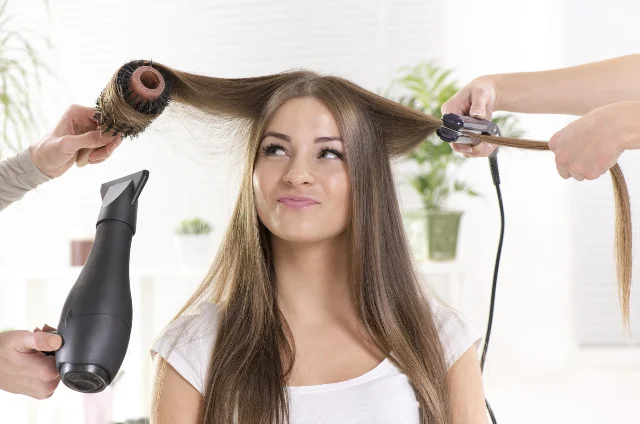
Hairstyling tools, like a straightener, curlers, etc., strip off the natural oil from hair, break down its hydrogen bonds, and tear the natural keratin layer, leading to extreme hair fall.
So, at least during this season, do not bring any extra damaging effects on your hair by using the hair styling tools.
Stay away from salon treatments
Salon treatments make the hair oily and greasy, causing extreme damage to the hair and scalp. Reschedule your hair color treatments, smoothening, perming, or other chemical treatments after the monsoon season.
You should even avoid using hair sprays during the monsoons. Instead of this, you can try these homemade hair masks to prevent hair fall in the comfort of your own home.
Diet Plan to Stop Hair Fall

Biotin
Intake of biotin is essential for your body to make keratin, a hair protein responsible for making hair stronger, smoother, and shinier.
Eggs are an excellent source of biotin, protein, and essential nutrients such as choline, and vitamins A, D, and B12. These nutrients are highly beneficial for your hair. If you are not a fan of eggs, you can opt for avocados, which are also rich in biotin and can help promote healthy hair.
Fenugreek seeds
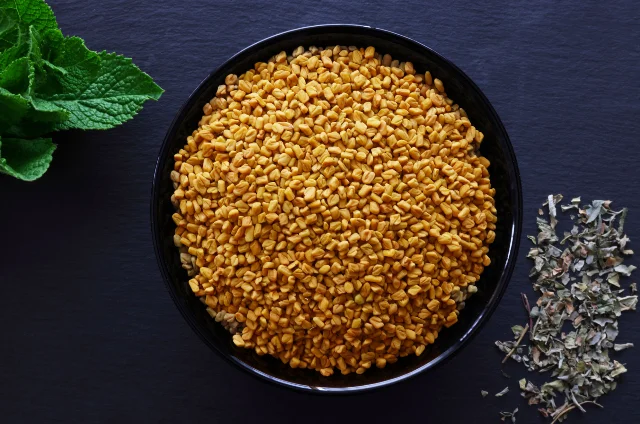
Fenugreek seeds, also known as methi, are rich in folic acid, nicotinic acid, Vitamins, proteins, and minerals. Which treats a variety of issues like dryness, baldness, and thinning of hair.
The seeds also help moisturize the hair and bring back the shine and bounce. It is tremendously helpful either as a supplement or hair treatment.
Green leafy veggies
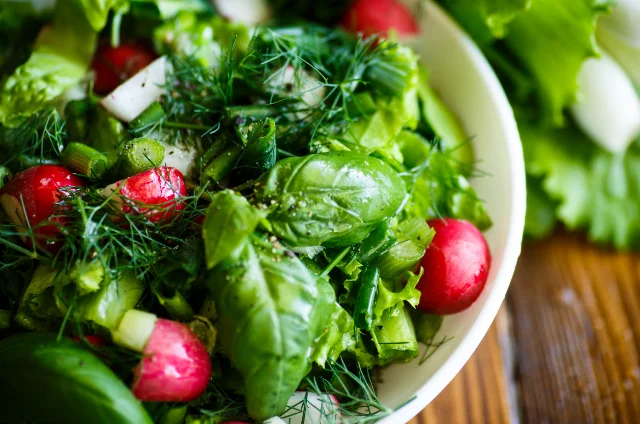
Eating green leafy vegetables such as spinach, broccoli, cabbage, and kale can be highly beneficial for promoting healthy hair growth. These veggies are rich in iron, vitamin A, and magnesium, which can help prevent hair loss and strengthen hair. Additionally, they contain omega-3 fatty acids that condition hair naturally and stimulate sebum secretion.
Berries
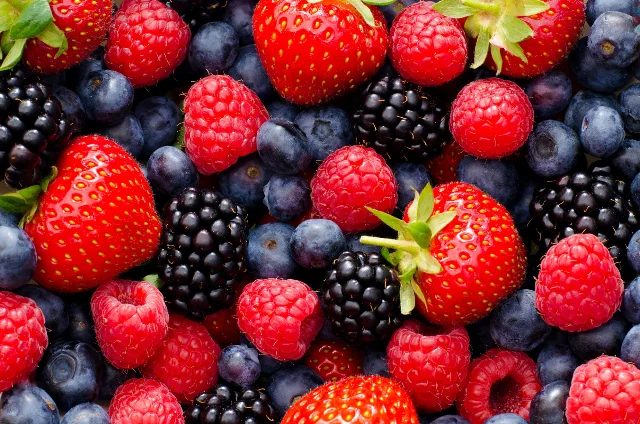
Antioxidants and vitamin C are essential for collagen production to help protect hair follicles against damage from harmful molecules called free radicals.
Berries like strawberries, blueberries, and cranberries are monsoon staples loaded with vitamin C and antioxidants.
What to do after getting drenched in rain?
- You need to clean your hair as soon as you reach home. Wash your hair with a mild shampoo to remove all the dirt, dust, and other particles from your hair.
- Now, after the cleansing, it’s time to provide deep nourishment to your hair. Conditioning is necessary to keep your hair frizz-free. Keep the conditioner for a while and then wash.
- Use a microfiber towel and gently wipe the excess water. Do not comb wet hair, allow your hair to dry properly and then comb your hair to prevent hair fall.
FAQ’s
-
Why does hair become frizzy in monsoon?
In rainy weather, your hair absorbs hydrogen, forming bonds, and swells until the smooth cuticle erupts, making it frizzy.
-
Which hair oil is the best for the rainy season?
Coconut, jojoba, and olive oil are highly beneficial during the rainy season. Even essential oils such as rosemary, lavender, and tea tree oil are great for the hair during monsoon.
-
Which hair pack is the best for hair growth?
Any hair packs containing avocado, amla, fenugreek seeds, and coconut oil are great for growth. Try any of the above-mentioned hair packs; they will help hair growth.

